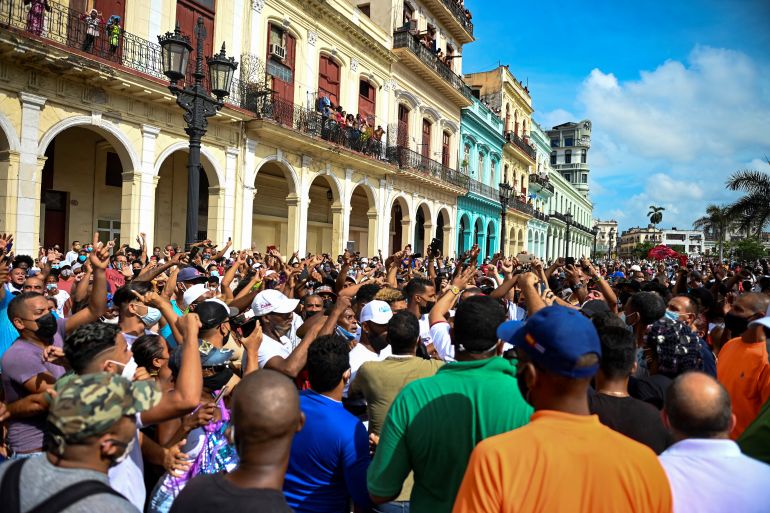Cuba slams US ‘involvement’ on anniversary of anti-gov’t protests
Havana accuses Washington of helping to ‘subvert law and order’ after Blinken hails determination of Cuban protesters.

Cuba’s foreign minister has accused the United States of being involved in efforts to “subvert law and order” in the country after President Joe Biden’s administration welcomed the courage of Cuban protesters who took to the streets last year in rare anti-government demonstrations.
In a statement on Monday marking the one-year anniversary of the Cuban protests, US Secretary of State Antony Blinken said Washington “celebrate[s] the Cuban people and commend[s] their indomitable determination in the face of oppression”.
Keep reading
list of 3 itemsCuba sanctions nearly 400 people over anti-government protests
Cuban court sentences two dissident artists to prison terms
“To the Cuban people: Americans watched with admiration on July 11, 2021 as tens of thousands of you took to the streets to raise your voices for human rights, fundamental freedoms, and a better life. And we stand with you as the Cuban regime, instead of welcoming the voices of the people, has condemned hundreds of protestors to decades-long prison sentences,” Blinken said.
Cuban Foreign Minister Bruno Rodriguez shot back on Twitter, saying Havana rejected Blinken’s comments “confirming direct involvement of government of that country in attempts to subvert order and peace in #Cuba in violation of International Law”.
We reject comments by US Secretary of State confirming direct involvement of government of that country in attempts to subvert order and peace in #Cuba in violation of International Law.#CubaPorLaPaz
— Bruno Rodríguez P (@BrunoRguezP) July 11, 2022
Thousands of Cubans took to the streets in the capital Havana and other towns on July 11, 2021, in protest over rising food costs, medical shortages and dire socio-economic conditions that worsened during the COVID-19 pandemic.
Some of the protesters took direct aim at the government of President Miguel Diaz-Canel, chanting “down with the dictatorship” and “we want liberty.” The all-but-unheard-of demonstrations rocked the Caribbean country, where authorities launched a mass crackdown on participants.
“During the protests, and in the weeks following them, the authorities arbitrarily detained hundreds of people without informing their families of their whereabouts, kept activists and independent journalists under extreme surveillance and cut off the population’s internet access,” Amnesty International said in a factsheet on Monday marking the anniversary.
“A year ago today, thousands of Cubans protested, demanding rights and freedoms, but the government gave many of them only two options: prison or exile,” Juan Pappier, a senior Americas researcher at Human Rights Watch, also said in a statement. “Governments in Latin America and Europe should urgently escalate their human rights scrutiny over Cuba and prioritize a concerted, multilateral response before this human rights crisis becomes even worse.”
Havana has accused Washington of sowing discontent among Cuban citizens and instigating the protests, while also pointing to the decades-old US embargo against the island as the main factor hurting the country’s economy.
In January, the Cuban authorities acknowledged that more than 700 people, including teenagers, faced criminal charges in relation to the protests, including “acts of vandalism, which [were] attempted against authorities, persons and property, and severe disruptions of public order”.
Last month, nearly 400 people were sanctioned for participating in the demonstrations. Of that, 297 people were sentenced to between five and 25 years in prison for crimes of sedition, sabotage, robbery with force, and public disorder, the attorney general’s office said.
In April, the US and Cuba held their highest-level talks since a severe disruption in ties during the Trump administration, discussing the pressing issue of migration, and the Biden government in mid-May announced it would ease some restrictions against the country.
But US criticism of the Cuban government’s response to the protests, and continued persecution of demonstrators, continues to be a major sticking point between the two nations.
On Saturday, the US State Department announced visa restrictions against 28 Cuban officials that it said were implicated in the crackdown on protests last year.
In a statement, the department said the restrictions would apply to high-ranking members of the Cuban Communist Party and officials who work in the country’s state communications and media sectors.
Rodriguez, the Cuban foreign minister, blasted the US measures and policy towards Cuba. “In view of failed attempt to provoke popular uprising in Cuba in 2021, the US government and its Secretary of State are seeking to discredit people’s victory over imperialist aggression,” he said.